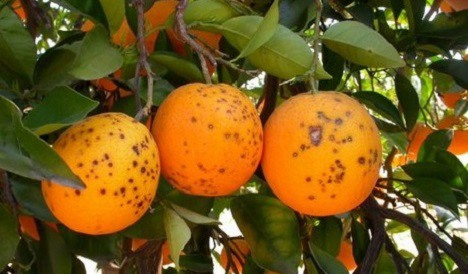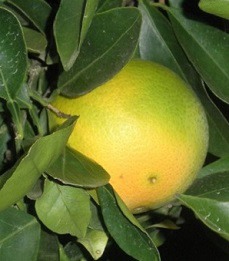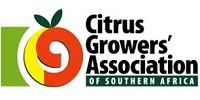South Africa will today be discussing a set of revisions to their current phytosanitary systems with the European Commission standing committee on plant health after a year of anomalously high citrus black spot and false codling moth interceptions.
South Africa’s citrus black spot management system has over the past few years proven its worth: interceptions of the fungus dropped from 50 down to just two in 2020. “Our system works, but it was never designed to cope with a black swan event the likes of which we had this year – eight weeks of a complete breakdown in logistics and the cold chain,” maintains Deon Joubert (right), the Citrus Growers’ Association’s envoy to the European Union.
“Our system works, but it was never designed to cope with a black swan event the likes of which we had this year – eight weeks of a complete breakdown in logistics and the cold chain,” maintains Deon Joubert (right), the Citrus Growers’ Association’s envoy to the European Union.
“South Africa has had the citrus black spot (CBS) and false codling moth (FCM) pests throughout all this time and South Africa displays remarkable capacity to self-regulate and mitigate the risk of pest symptoms to virtually zero in some years which translates to 99.99% of consignments free of pests. Even in bad years like 2021, the result implies that 99.8% of consignments are free of any pest symptoms.”
The past year was a “screw-up”, he admits, when the civil unrest in KwaZulu-Natal and Gauteng followed by a cyber attack and worldwide shipping problems meant that at any given moment during July and August around 300,000 pallets of citrus were stranded somewhere along the chain between packhouse and port. The national road between citrus orchards in Limpopo and Mpumalanga and the port of Durban was totally closed for days on end.
Fruit would get to port but there’d be no vessel, or a vessel would dock and fruit would still be stuck somewhere along the way, and there was no way of ensuring an uninterrupted cold chain, the way the citrus industry usually does every year.
“We knew trouble was looming,” Deon says, and it came in the form of 43 interceptions of the citrus black spot fungus and 15 interceptions of false codling moth larvae on the 750,000 tonnes of citrus (50 million cartons of 15kg equivalence) that South Africa sends to the European Union, which represents 31.25% of South Africa’s total citrus export crop.
“We don’t want the events of 2021 leading to excessive measures to be introduced. We believe our research on the life cycles of the pests under discussion is excellent.”
South Africa spends over R4 billion annually on CBS & FCM mitigation
South African citrus earns between R8.3 billion to R10 billion annually in the EU (total 2020 earnings on citrus were R25 billion or 1.424 billion euros) and employs over 140,000 people. The deployment of risk mitigation measures on CBS and FCM symptoms cost the industry in excess of R4 billion (229.4 million euros) annually, according to a recent analysis by the Bureau for Food and Agricultural Policy.
Intensive meetings have followed between the Department of Agriculture, Land Reform and Rural Development and the Citrus Growers’ Association and other stakeholders in South Africa’s fresh produce cold chain to review the past season and offer up possible revisions to the process.
Review of orchard registration for EU
“Analysing the data of the 2021 season, there seems to be some areas that could be strengthened with regards to the CBS risk management system as it currently stands,” Deon observes.
An example of this is the eight CBS interceptions on navels from a single group of citrus farmers in a region of the Eastern Cape. Navels traditionally have had very few CBS interceptions and the fungus only occurs in the summer rainfall areas of South Africa; it has never spread to areas with a winter rainfall climate within South Africa or elsewhere like California.
 Citrus black spot lesions
Citrus black spot lesions
“By the end of July we put in extra precautions and decided to only allow fruit to Europe from citrus farms on the CBS-free list. This is a list of all orchards from the summer rainfall regions with no history of CBS interceptions, either locally or internationally.”
He adds: “In actual fact black spot has only been found in very few areas of SA. I would say 5% or fewer of South African citrus orchards have ever had black spot interceptions.”
The CGA is working on establishing a list of orchards which have historically been free of CBS over a certain period.
FCM: more emphasis on orchard detection and shipping protocol adherence “False codling moth is a whole different kettle of fish,” says Deon, and it has only been a quarantine pest for two years. South Africa does not dispute that false codling moth could pose a phytosanitary risk to the EU.
“False codling moth is a whole different kettle of fish,” says Deon, and it has only been a quarantine pest for two years. South Africa does not dispute that false codling moth could pose a phytosanitary risk to the EU.
Right: larval penetration holes of FCM are detected through close inspection
“The false codling moth risk management system (FMS) is strongly based on a sustainable and non-chemical approach of monitoring FCM. It has moved away from a blanket chemical approach to active monitoring to address areas of detection. The last leg of the system is a comprehensive cold shipping temperature regime which is designed and been scientifically proven to be extremely detrimental to any possible survival of FCM larvae post-FMS shipment.”
More emphasis will be placed on orchard detection and shipping protocol adherence.
Disputed number of FCM interceptions
Meanwhile, the CGA is not convinced of the validity of all 15 FCM interceptions.
“South Africa respectfully requests enhanced cooperation with the EU and relevant member state NPPOs so as to further build confidence in the system of 'live detection' especially with regards to the standards set in the Netherlands during the second half of 2021 to lead to improved confidence and assisted compliance.”
He adds: “2021 was an extraordinary season characterised by force majeure. Nonetheless, we will strengthen our risk management even further, so as to withstand any shocks even better in future seasons. South Africa will work diligently to enhance any current system to improve its track record and compliance with current EU legislation.”
 For more information:
For more information:
Deon Joubert
Citrus Growers’ Association
Tel: +27 31 765 2514
Email: info@cga.co.za
http://www.cga.co.za
